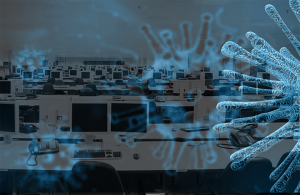National survey confirms Covid 19 terror in contact centres
Telecoms & Financial Services, Union Matters, Call Centres, Health & Safety April 28 2020
Close proximity working, worries about cleaning/ sanitisation regimes – especially in hotdesking situations – and a widespread puzzlement over ‘key worker’ designations being applied to clearly non-essential workstreams have all emerged as headline findings of a major national survey of contact centre workers.
Nearly three weeks after the online survey was emailed out to thousands working in call centres the length and breadth of the UK by a number of unions, including the CWU, early findings have confirmed the massive discrepancy between the best and worst responses by employers to the risk of such workplaces becoming a hotbed for the spread of the coronavirus pandemic.
Led by globally-renowned contact centre expert, Phil Taylor – professor of Work and Employment studies at Strathclyde University – the survey has so far been completed by nearly 2,800 respondents across the country. While more data is still coming in, the intermediary findings, which were poignantly published this morning to mark Workers Memorial Day, paint a worrying picture of poor and even reckless practice in many areas – juxtaposed by exemplary responses by some employers.
Headline findings of the intermediary report, which can be viewed in full here include:
- Almost 88% of respondents saying they thought they were likely or very likely to catch Covid 19 on account of their working conditions
- Sharply rising fear levels in contact centres, with seven in ten (69.7%) saying they were ‘very scared’ about going into work compared with the 58% or respondents who that answered that question just seven days previously
- 75.2% of respondents saying that they knew of colleagues who had developed Covid19 symptoms, compared to 9.2% who did not
- 37.8% saying they were seated less than the required 2 metres from colleagues
- Almost 73% believing that social distancing was inadequate and ‘hazardous’ or ‘very hazardous’ – with more than one-in-three reporting still being expected to participate in close contact team meetings, ‘huddles’ or one-to-ones with their manager
- Deep concern about hot-desking, with almost one-in-two (47%) accusing management of being ‘very ineffective’ in making sure call handlers have their own designated workstation.
- Two thirds of respondents questioning the validity of the ‘essential’ or ‘key’ worker designation that their employers have placed on them to justify their having to continue attending busy workplaces during the lockdown.
Professor Taylor explains: “Drawing on the direct experience and testimony of 2,750 contact centre workers, this report reveals the serious hazards faced by an almost invisible army of front line workers who are playing a vital role in keeping society going at this time of crisis.
“It’s clear that contact centre workers are being exposed to enormous risks in their workplaces from Covid-19 – but, alongside bad practice, there is exemplary behaviour where some employers are being highly responsive to requests for supportive home working and are implementing good procedure.
“We need a levelling up of practice, and we need it urgently.”
The mixed bag of excellent, good, bad and downright ugly practice reflects the feedback that the CWU is receiving from its own telecoms and financial services contact centre members – with some companies leaving no stone unturned to allay employee concerns and minimise the risk of Covid 19 transmission, right the way through to others which have shown scant regard for employee welfare to date.
Deputy general secretary Andy Kerr explains: “The spectrum of company responses we’re seeing is a broad one – but what I would say is that, by and large, the situation tends to be better in those companies where the CWU has had a long history of effective collective bargaining than in companies where we have only small pockets of recognition, or no union recognition at all.
“While it’s heartening to see the mass shift that is currently taking place towards homeworking for front line contact centre advisors in BT Consumer and EE , and similarly enlightened responses by companies like Telefonica/O2, sadly that is by no means universal.
“Today, the trade union movement marks the annual Workers’ Memorial Day commemoration of all those who have lost their lives as a result of their work, so the damning verdict of this major national survey into the response of the contact centre sector to Covid 19 could not be more timely.”

